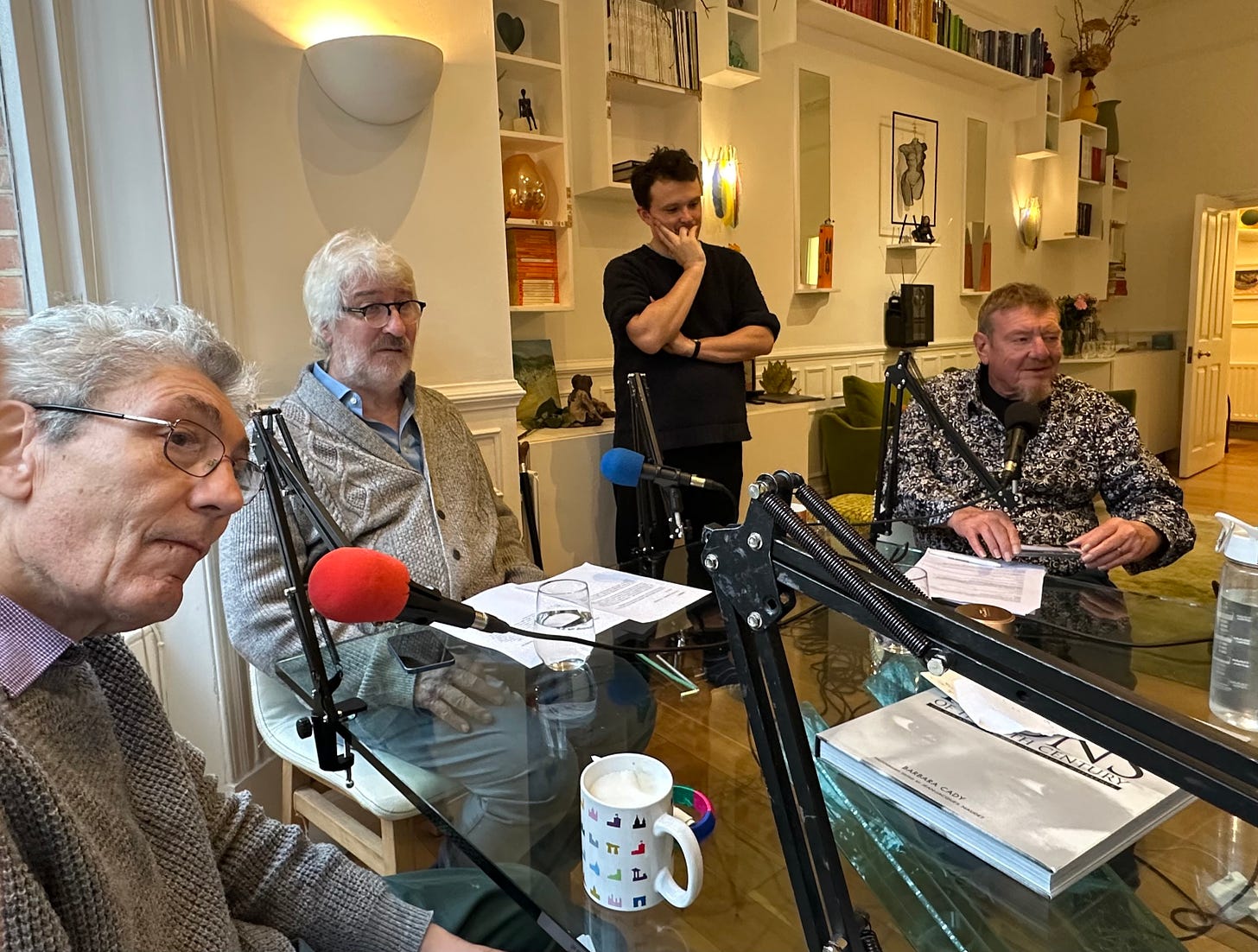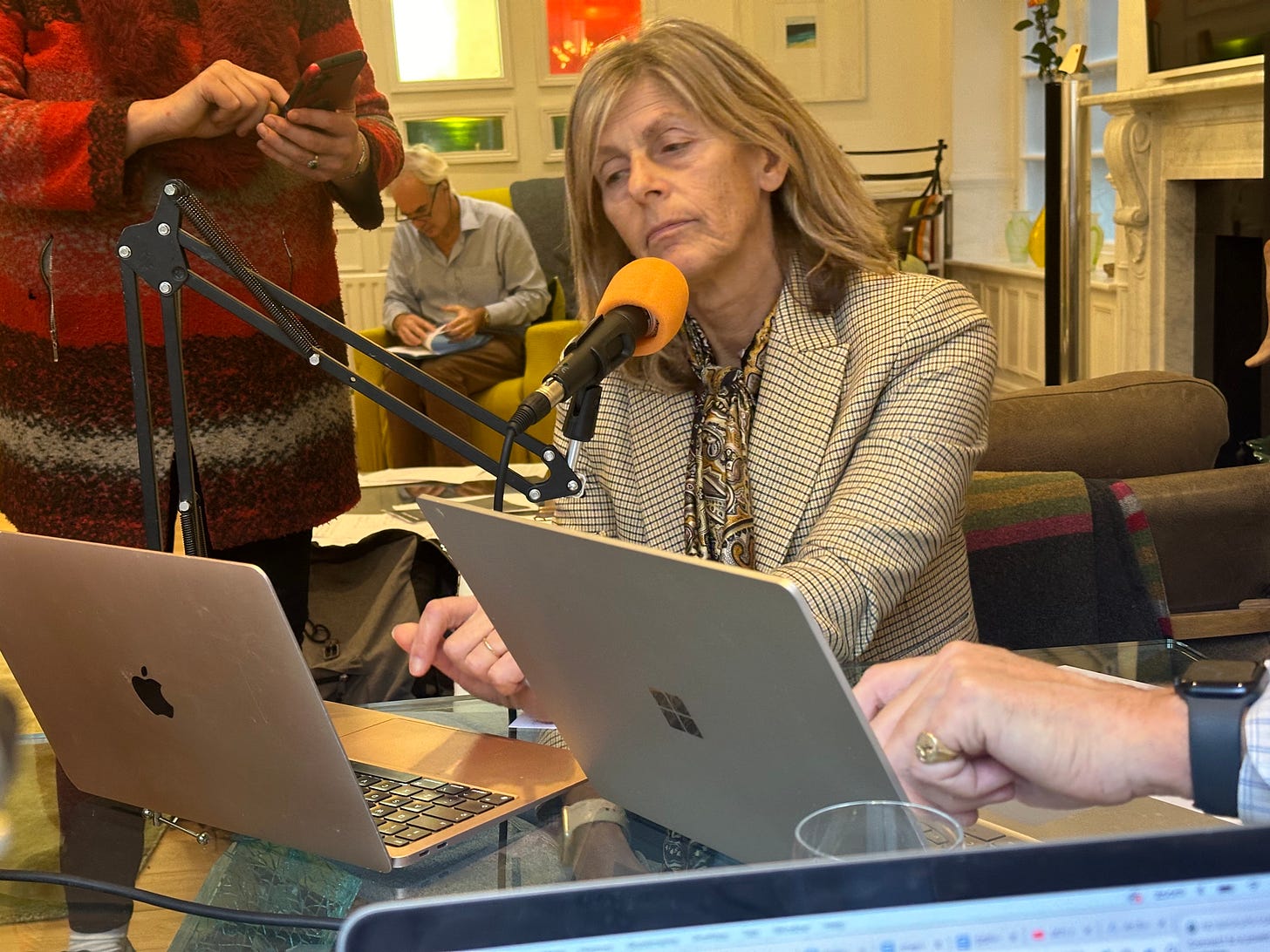Should our podcast about living with Parkinson’s have a mission? Does anybody care what six random people - even if they include a retired High Court judge and the most feared TV interrogator of the last 30 years - think about anything? The final episode of series 2 of Movers and Shakers grapples with these existential questions as we consider whether we should publish a Parky Charter, a call to arms for the Parkinson’s community demanding the government and the NHS act to improve our care.
The leading proponent of the Charter is Gillian Lacey-Solymar who has been thinking about this for quite a while. She explains that the idea was sparked by reading the many messages we have received from listeners:
“We've had so many letters, with people saying that at diagnosis, they were given insufficient information afterwards, they can't see their neurologists every year, all sorts of problems. And so the idea was to put together a charter, and to say to the government and the NHS, look, we as people with Parkinson's would like some change here.”
Gillian has prepared her charter, building it using as a mnemonic the latin phrase Carpe Diem - seize the day - her personal philosophy. So the C stands for “cure”, A for “access” and so on.
But as befits the anarchic collective we are - the judge thinks he’s in charge but he really isn’t - the very idea of a charter, let alone what to put in it, soon comes under attack.
Jeremy Paxman questions whether anyone will listen to us:”What we have to realise is we can only complain, we have no authority over ministers or health officials, or anyone else.”
“What is the strategy?”asks Mark Mardell. “Are the aspirations just things that will be generally nice or things that we think can be adopted and would make a difference?”
Gillian points out that “nice” is apt - NICE (National Institute for Health and Care Excellence) has issued guidelines on the treatment of Parkinson’s but often they are ignored.
And Paul Mayhew-Archer objects to the first item on Gillian’s mnemonic: “I actually want to question the cure thing. Because I think the money spent on trying to find a cure is a lot of wasted money - it could be spent better on looking after the people who have Parkinson's.”
But Judge (retd) Nick Mostyn is more supportive of the idea - he thinks we will be taken seriously: “We are all powerful or have been powerful. We have got sharp elbows, we have got a substantial audience that listens to us, and we are in a position to exercise influence.”
The judge has spent some time drafting Gillian’s Carpe Diem charter into a legal contract between people with Parkinson’s and the state, with each. having their own responsibilities. There is broad agreement that this is a bad idea - we don’t see why we need to promise to behave ourselves, we don’t need any legal mumbo jumbo and ,above all, “Quidquid agis, devita Latinam” - whatever you do, avoid Latin.
But having got that off our chests, we begin to contemplate a simpler clearer charter - perhaps five demands for better Parkinson’s care, and no mnemonic. Jeremy is clear about the number one demand - everyone should be entitled to a diagnosis within a certain time. There are nods around the table - we have all been shocked by stories from listeners who suspect they have Parkinson’s but have to wait a year or more for an appointment with a neurologist. Surely everyone should be guaranteed the chance to see a specialist within six. months?
We bat round some other ideas. We like the idea of clear information in the form of a leaflet being given to everyone who is diagnosed with Parkinson’s rather than a brusque “it’s a degenerative disease and there’s no cure.” Nick Mostyn is keen that people are given what he describes as “holistic” treatment - not just offered pills, but advice about exercise and diet, insomnia and mental health.
We agree that Parkinson’s nurses play a vital role and everyone should have access to one. We also admire the campaign Parkinson’s UK has been running to make sure Parkies get their drugs on time when they are in hospital and some of us want that in the charter.
But as the debate continues about exactly what to put in and how we would measure success we begin to realise that we are not going to get this sorted in one session. In any case, the Movers and Shakers Christmas lunch, kindly prepared by Gillian in whose home we are meeting, awaits us.
So we decide to set you - our audience - a challenge. What five demands should go in our Parky Charter? And as Paul Mayhew-Archer says, we want to hear not only from people with Parkinson’s and their families and carers but from the neurologists doing cutting edge work in the quest for a cure.
We will be back in February with a new series and there will be an episode about the Parky Charter early on. So please send us your ideas to:
feedback@moversandshakerspodcast.com





I only have two comments to make, 1) If not you lot, then who? 2) Agree with Jeremy, an entitlement to a clear diagnosis within a given time limit.
Lots of comments I could add but one is definitely about a quality booklet resource on diagnosis. HwP was diagnosed 3 years ago took 8 months to actually get the tests & now we know symptoms some had started at least 15 years prior! No info- if you have x, y & z see your GP etc. Once diagnosis it was a huge blow & no support or information at this point. Couldn't get in contact with specialist nurses. Our GP did loads of 'fighting' on his behalf. Only through, a lot of digging we found various organisations- it's not well known. To us it was "old people shaking" we had nothing to educate us.
On the other hand, last week I got a cancer diagnosis (please, no comments, this is not about me). The info on cancer education is vast- you have adverts for screening & symptoms to act fast, yes I know time is if the essence but not the point I make. Mine is totally curable & I caught it literally with 1st symptom. I have been given a rediculous amount of information on the day (most of which I don't want to know) by a certain cancer charity via specialist nurse- I have 2 specialist nurses, given direct line & emergency number. This time next year I'll be fine- HwP won't be. I definitely think education on symptoms, what PD is and info booklet on diagnosis with what, how etc when & where to get medical help, access contacts to specialist nurses/ emergency and details of charities/support etc is definitely needed. I'd be up for helping in terms of patient experience on this.